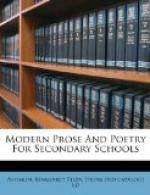Three years passed in sordid struggle and disappointment. He was not prepared to make a living even in America, where the day laborer eats wheat instead of rye. Apparently the American flag could not protect him against the pursuing Nemesis of his limitations; he must expiate the sins of his fathers who slept across the seas. He had been endowed at birth with a poor constitution, a nervous, restless temperament, and an abundance of hindering prejudices. In his boyhood his body was starved, that his mind might be stuffed with useless learning. In his youth this dearly gotten learning was sold, and the price was the bread and salt which he had not been trained to earn for himself. Under the wedding canopy he was bound for life to a girl whose features were still strange to him; and he was bidden to multiply himself, that sacred learning might be perpetuated in his sons, to the glory of the God of his fathers. All this while he had been led about as a creature without a will, a chattel, an instrument. In his maturity he awoke, and found himself poor in health, poor in purse, poor in useful knowledge, and hampered on all sides. At the first nod of opportunity he broke away from his prison, and strove to atone for his wasted youth by a life of useful labor; while at the same time he sought to lighten the gloom of his narrow scholarship by freely partaking of modern ideas. But his utmost endeavor still left him far from his goal. In business nothing prospered with him. Some fault of hand or mind or temperament led him to failure where other men found success. Wherever the blame for his disabilities be placed, he reaped their bitter fruit. “Give me bread!” he cried to America. “What will you do to earn it?” the challenge came back. And he found that he was master of no art, of no trade; that even his precious learning was of no avail, because he had only the most antiquated methods of communicating it.
So in his primary quest he had failed. There was left him the compensation of intellectual freedom. That he sought to realize in every possible way. He had very little opportunity to prosecute his education, which, in truth, had never been begun. His struggle for a bare living left him no time to take advantage of the public evening school; but he lost nothing of what was to be learned through reading, through attendance at public meetings, through exercising the rights of citizenship. Even here he was hindered by a natural inability to acquire the English language. In time, indeed, he learned to read, to follow a conversation or lecture; but he never learned to write correctly, and his pronunciation remains extremely foreign to this day.




